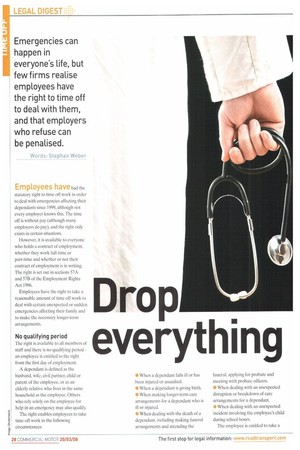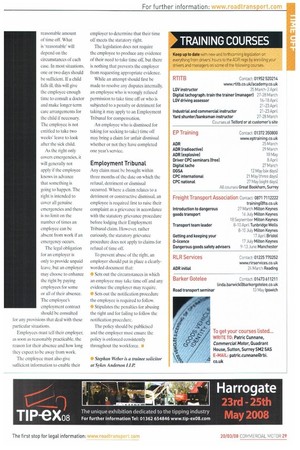Drop everything
Page 28

Page 29

If you've noticed an error in this article please click here to report it so we can fix it.
Employees have had the statutory right to time off work in order to deal with emergencies affecting their dependants since 1999, although not every employer knows this. The time off is without pay (although many employers do pay), and the right only exists in certain situations.
However, it is available to everyone who holds a contract of employment, whether they work full-time or part-time and whether or not their contract of employment is in writing. The right is set out in sections 57A and 57B of the Employment Rights Act 1996.
Employees have the right to take a reasonable amount of time off work to deal with certain unexpected or sudden emergencies affecting their family and to make the necessary longer-term arrangements.
No qualifying period
The right is available to all members of staff and there is no qualifying period — an employee is entitled to the right from the first day of employment.
A dependant is defined as the husband, wife, civil partner. child or parent of the employee, or as an elderly relative who lives in the same household as the employee. Others who rely solely on the employee for help in an emergency may also qualify.
The right enables employees to take time off work in the following circumstances: • When a dependant falls ill or has been injured or assaulted.
• When a dependant is giving birth.
• When making longer-term care arrangements for a dependant who is ill or injured.
• When dealing with the death of a dependant, including making funeral arrangements and attending the funeral, applying for probate and meeting with probate officers.
• When dealing with an unexpected disruption or breakdown of care arrangements for a dependant.
• When dealing with an unexpected incident involving the employee's child during school hours.
The employee is entitled to take a reasonable amount of time off. What is 'reasonable' will depend on the circumstances of each case. In most situations, one or two days should be sufficient. If a child falls ill, this will give the employee enough time to consult a doctor and make longer-term care arrangements for the child if necessary The employee is not entitled to take two weeks' leave to look after the sick child.
As the right only covers emergencies, it will generally not apply if the employee knows in advance that something is going to happen. The right is intended to cover all genuine emergencies and there is no limit on the number of times an employee can be absent from work if an emergency occurs.
The legal obligation for an employer is only to provide unpaid leave, but an employer may choose to enhance the right by paying employees for some or all of their absence. The employee's employment contract should be consulted for any provisions that deal with these particular situations.
Employees must tell their employer, as soon as reasonably practicable, the reason for their absence and how long they expect to be away from work.
The employee must also give sufficient information to enable their employer to determine that their time off meets the statutory right.
The legislation does not require the employee to produce any evidence of their need to take time off, but there is nothing that prevents the employer from requesting appropriate evidence.
While an attempt should first be made to resolve any disputes internally, an employee who is wrongly refused permission to take time off or who is subjected to a penalty or detriment for taking it may apply to an Employment Tribunal for compensation.
An employee who is dismissed for taking (or seeking to take) time off may bring a claim for unfair dismissal whether or not they have completed one year's service.
Employment Tribunal Any claim must be brought within three months of the date on which the refusal, detriment or dismissal occurred. Where a claim relates to a detriment or constructive dismissal, an employee is required first to raise their complaint as a grievance in accordance with the statutory grievance procedure before lodging their Employment Tribunal claim. However, rather curiously, the statutory grievance procedure does not apply to claims for refusal of time off.
To prevent abuse of the right, an employer should put in place a clearlyworded document that:
40 Sets out the circumstances in which an employee may take time off and any evidence the employer may require.
• Sets out the notification procedure the employee is required to follow. * Stipulates the penalties for abusing the right and for failing to follow the notification procedure.
The policy should be publicised and the employer must ensure the policy is enforced consistently throughout the workforce. 51








































































































































































